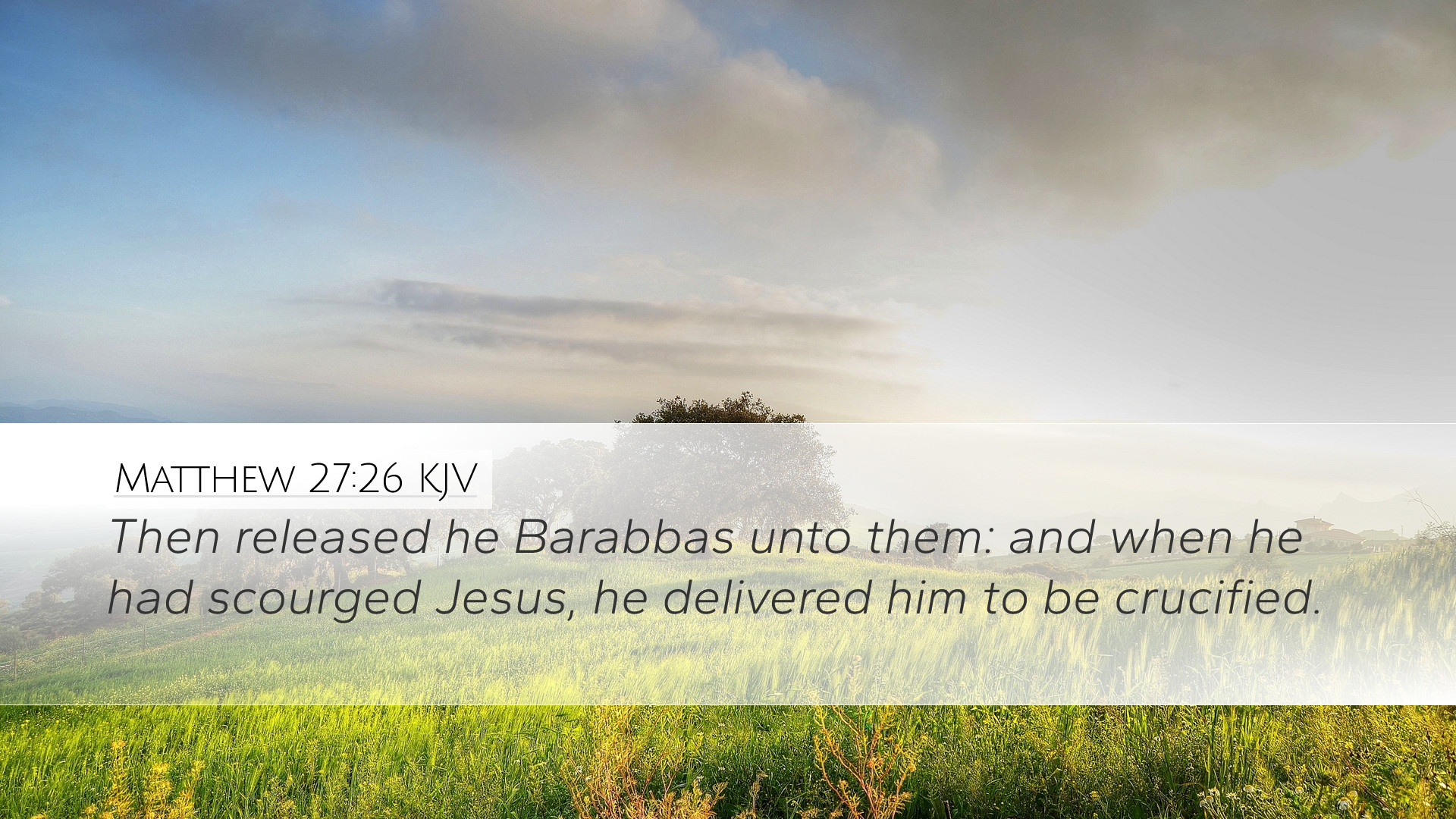Commentary on Matthew 27:26
Verse Reference: Matthew 27:26 - "Then he released Barabbas to them; and when he had scourged Jesus, he delivered Him to be crucified."
Introduction
Matthew 27:26 encapsulates a critical moment in the Passion narrative, highlighting the choices made by both Jesus and the crowd. The act of releasing Barabbas and subjecting Jesus to scourging holds profound theological implications and signifies the gravity of human sin and divine grace.
Contextual Analysis
This verse occurs within the context of Jesus' trial before Pilate. Public domain commentaries provide rich insights into the historical, cultural, and spiritual meanings behind this event.
Historical Context
At the time of Jesus’ crucifixion, the Jewish people were under Roman authority. The practice of releasing a prisoner during Passover was a custom instituted by the Roman governor, and Barabbas, characterized as a notorious criminal, becomes the focal point of this custom.
Theological Implications
- Substitutionary Atonement: The choice of Barabbas—a man guilty of rebellion—symbolizes the reality of substitution in the Christian faith. Just as Barabbas was freed, believers are freed from sin through the sacrifice of Jesus.
- The Nature of Sin: The release of Barabbas illustrates the pervasiveness of sin within humanity. The crowd’s choice reflects the moral depravity that chooses earthly desire over divine righteousness.
- Divine Sovereignty: Despite human sinfulness, God's plan is sovereign. The events leading to the crucifixion were foretold and fulfill God’s redemptive purposes through Jesus.
Commentary Insights
Matthew Henry
Matthew Henry emphasizes the cruel irony of the moment, where an innocent man, Jesus, is condemned while a criminal, Barabbas, is set free. This highlights the fallen state of humanity, which often opts for sin over righteousness. Henry notes that the scourging of Jesus was not only a physical punishment but served as a spiritual preparation for the ultimate sacrifice.
Albert Barnes
According to Albert Barnes, the release of Barabbas should be seen as a reflection of the human heart’s inclination towards sin and rebellion. Barnes explains that the act fulfills the prophecy of a Suffering Servant who bears the chastisement for our peace. This moment serves as a striking representation of injustice and the depth of Christ’s love, as He willingly absorbs the punishment that Barabbas rightfully deserves.
Adam Clarke
Adam Clarke describes the scourging that Jesus endured as a brutal act meant to placate the crowd. He points out the cultural significance of scourging, likening it to a trial by ordeal. Clarke adds that this act was a part of the fulfillment of the prophecy, emphasizing that Jesus, who was innocent, took upon Himself the sins of the world, exemplifying the essence of sacrifice.
Applications for Today
This verse and its surrounding narrative offer several applications for modern readers, particularly for pastors, students, and theologians:
- Understanding Grace: The substitution of Barabbas can lead believers to a deeper understanding of grace, the concept that we are all deserving of punishment yet freely receive grace through Christ.
- Confronting Injustice: The injustice faced by Jesus challenges believers to confront the injustices in their own contexts. How do we as a community respond to societal injustices that mirror the condemnation of the innocent?
- Learning from the Crowd: The crowd’s choice reminds us to examine the influences of culture and society on our choices. Are we aligning ourselves with the values of Christ or the whims of the world?
Conclusion
Matthew 27:26 serves as a pivotal point in the narrative of Jesus’ crucifixion. The implications of releasing Barabbas while condemning Jesus are profound and set the stage for the understanding of redemptive suffering and the nature of forgiveness. Through the insights of early biblical commentators, readers are encouraged to reflect on their own lives in light of this Scripture, recognizing the depth of Christ's sacrifice and the overwhelming power of God’s grace.


